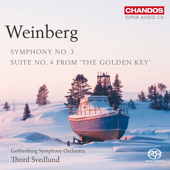
ESSENTIAL RECORDINGS

Written in 1949-50, at a time when the soviet 'anti-formalism' campaign was in full swing, didn't discourage or prevent Mieczyslaw Weinberg from
composing, in my opinion, one of his most charming and individual symphonies. I've often, like many others, compared his music to the music of his friend and contemporary,
Dmitri Shostakovich, pointing out the many influential similarities between the two. This, his Symphony No. 3 in B minor, Op. 45 on the
other hand, is very much a voice all its own. Based on many Russian folk elements, it boasts an ease of melodic creation and rhythmic fluidity rarely heard from either of
these two composers, or from any mid-20th century composers for that matter. Only the beautiful and melancholy Adagio movement reveals its origin, with
sad and gripping writing matched only by its skillful scoring for strings. The Gothenburg Symphony Orchestra cellos and violas shine in this movement,
and give the music an appropriately dusky and autumnal tone that lends itself very well to the overall mood of the movement. The final boisterous movement is the only
one that reveals the Shostakovich friendship, with a few typical rhythmic gestures, military drum rolls, orchestration tactics, and well achieved climactic moments with a
coda to match. A short symphony packed with inventiveness, creative ideas, and most of all a writing skill matched by few. At the present time, this new recording seems
to be the only recording available of this captivating symphonic work well worth investigating.
This Weinberg dedicated series of recordings from Chandos has been a pleasure to follow since day one. Every single release in the series has been a
thrill to listen to, including this one. If your musical taste and preference leans towards the Russian masters, like Prokofiev and Shostakovich, this recording should feel
right at home within your collection.
Jean-Yves Duperron - June 2011